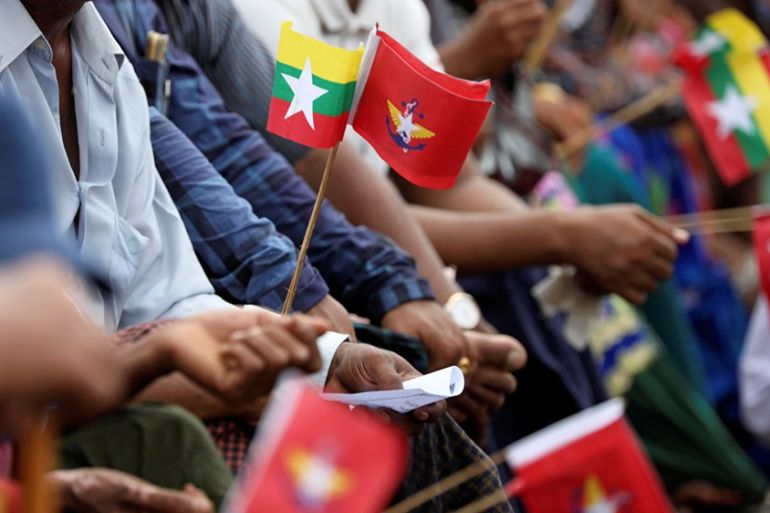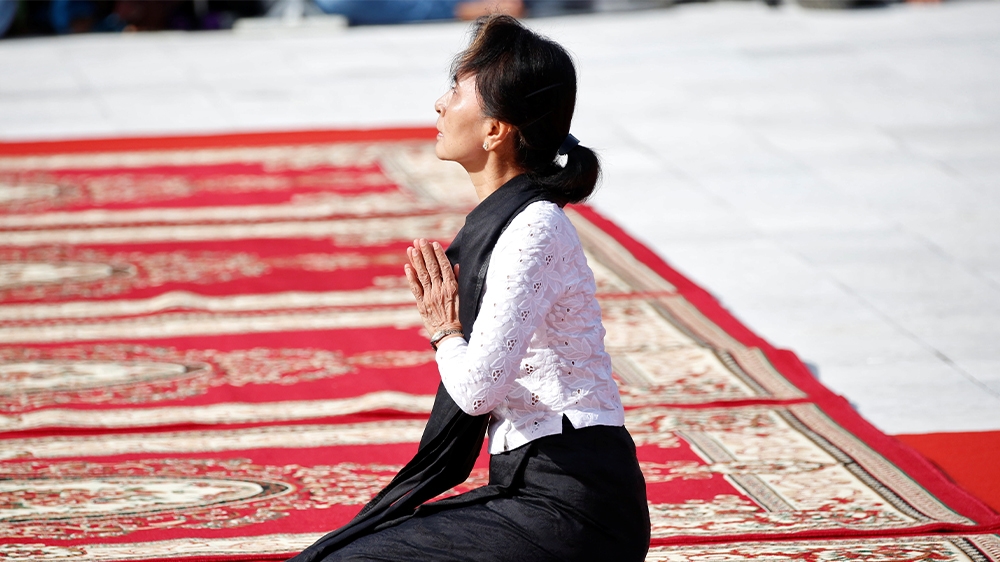‘As expected’: People in Myanmar shrug off ICJ Rohingya ruling
Despite indifference to legal cases some ethnic minority groups are backing the Rohingya to push back against military.

Yangon, Myanmar – While thousands rallied in Yangon in December to support Myanmar‘s government as it contested allegations of genocide at the International Court of Justice, the public response to the first of the court’s rulings has been decidedly more muted.
The ICJ imposed a series of provisional measures on Myanmar last week, ordering it to take certain action to prevent future acts of genocide against the Rohingya Muslim minority.
Keep reading
list of 4 itemsConflict, climate, corruption drive Southeast Asia people trafficking: UN
Bodies of three Rohingya found as Indonesia ends rescue for capsized boat
How is renewed violence in Myanmar affecting the Rohingya?
The judges also rejected Myanmar’s motions to dismiss the case, which means the trial will now proceed to hear arguments on the alleged genocide itself.
The decision brought criticism from officials. Than Htay, the chairman of the military-aligned opposition Union Solidarity and Development Party claimed “all 52 million people” in Myanmar would disagree with it, according to The Standard Time Daily, a local newspaper.
But on the streets of the country’s biggest city, the ruling barely registered.
Two students who spoke to Al Jazeera separately both said neither they nor their friends particularly cared about the ICJ. “Yes I know about it, but I don’t really follow it,” said one.
Another woman, from Rakhine but living in Yangon, said the result was “as expected”. When asked if she agreed with the ruling, she said: “Yes. It should be.”
The ICJ case against Myanmar was brought by the Gambia accusing the country of committing genocide in its actions against the Rohingya and a brutal military crackdown in Rakhine in 2017 that sent 740,000 people fleeing across the border to Bangladesh.
Separate, independent investigations including the United Nations Fact-Finding Mission have found evidence of genocide and war crimes, amid reports of massacres, rape, and arson.
‘Defame our country’
The Ministry of Foreign Affairs in Myanmar said in a statement that the government had taken note of the ICJ decision, but did not indicate if it would follow its orders.
Referencing the government-appointed Independent Commission of Enquiry report, which was widely dismissed as a whitewash, the ministry said there had been “no genocide in Rakhine”.
The statement went on to say that the accusations were an “unsubstantiated condemnation” of Myanmar, creating a “distorted picture” of the situation in the far western state.
Shortly before the ruling, State Counsellor Aung San Suu Kyi, who led the country’s team at the ICJ, asked the international community to give Myanmar more time to institute domestic justice.
International justice, she said in an op-ed published in the UK’s Financial Times, can “too easily become attached to specific testimonies of victimisation and consequently rendered inseparable from the narrative they feed”.
The woman who spent decades under house arrest and was awarded the Nobel Peace Prize in 1991 suggested that reports of violence and rights abuses from Rohingya victims may have been inaccurate or exaggerated.

After the ruling, Myo Myunt, a spokesman for the ruling National League for Democracy, said he was not surprised at the decision because The Gambia had support from international legal experts, the Organisation of Islamic Cooperation, and some European countries.
“We never underestimated their capability with regard to the case,” he said, adding that he could not comment in detail until the issue was discussed internally.
Local media also repeated the government line, with political analyst Than Soe Naing telling News Watch Weekly vehemently denying the charges.
“The court ordered Myanmar to prevent genocide but there’s no need to make that order because the decision is not related to the current situation. There is no report of such activity in the region now. Everyone knows it. I think the decision is made to defame our country,” he wrote.
Minorities back Rohingya
In a rare show of public defiance, more than 100 domestic civil society groups released a statement ahead of the ruling categorically rejecting that narrative and condemning the military for what they said was a history of violence and intimidation.
“We understand very clearly that the ICJ case against Myanmar is directed toward those responsible for using political power and military might, and not to the people of Myanmar,” said the statement, which was signed by many of Myanmar’s most prominent non-profit groups.

The case has also become somewhat of a unifying force among the country’s ethnic minorities. While the government has tried to use nationalism to rally its supporters, many ethnic armed groups – themselves battling the armed forces – have said they support the trial.
Htuu Lou Rae Den, founder of ethnic and religious harmony group Coexist Myanmar, said the case has inspired support for the Rohingya.
“We can definitely see an increase in acceptance and support for the Rohingya by other ethnic minorities locally and abroad since the beginning of the case,” he told Al Jazeera, but added that some are supporting the Rohingya just to push back against the military, and do not truly accept them as citizens.
He also said he did not expect Myanmar to obey the court orders on provisional measures, as they were overly vague and did not include a requirement that Myanmar allow independent investigators to access Rakhine.
“To hedge against this, ICJ should review and modify the measures to incorporate clear objectives, measurable targets and indicators of achievements,” Htuu Lou Rae Den said.
Sam Zarifi, Secretary General of the International Commission of Jurists, warned that should Myanmar not comply it would hurt its legal standing in other cases that are underway, including an investigation by the International Criminal Court.
“Every time the government does not respond it accumulates as lack of accountability and obstruction that counts as evidence of wrongdoing,” Zarifi said during an interview in Yangon.